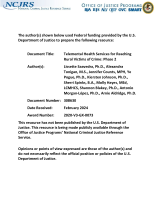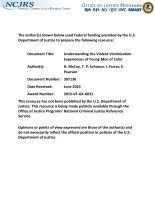Rural victims
Telemental Health Services for Reaching Rural Victims of Crime: Phase 2
Inclusive Research: Engaging People Closest to the Issue Makes for Better Science & Greater Impact; 2023 NIJ Research Conference Plenary
This panel will discuss what inclusive research is, how to conduct it, and what issues and challenges exist about engaging in it. “Inclusive research” has its history as a participatory research method designed to ensure people closest to the issue or problem under study are authentically engaged in the research process rather than simply being “research subjects.” While community-based participatory research has begun to take on greater prominence in the criminal justice realm, such efforts are largely confined to qualitative research inquiries.
See the YouTube Terms of Service and Google Privacy Policy
Understanding the Violent Victimization Experiences of Young Men of Color
Phase 2: TeleMental Health Services for Reaching Rural Victims of Crime
Separation and/or Divorce Sexual Assault in Rural Ohio: Preliminary Results of an Exploratory Study
Policy, Place, and Perpetrators Using NIBRS to Explain Arrest Practice in Intimate Partner Violence
Civil Protection Order Enforcement
T.K. Logan discusses her study that looked at the impact of civil protective orders for domestic violence victims in five Kentucky jurisdictions. Civil protective orders, sometimes known as restraining orders, may cover various situations, such as ordering an assailant to avoid a victim's home and workplace or forbidding any contact with the victim, including by mail or telephone.
See the YouTube Terms of Service and Google Privacy Policy



